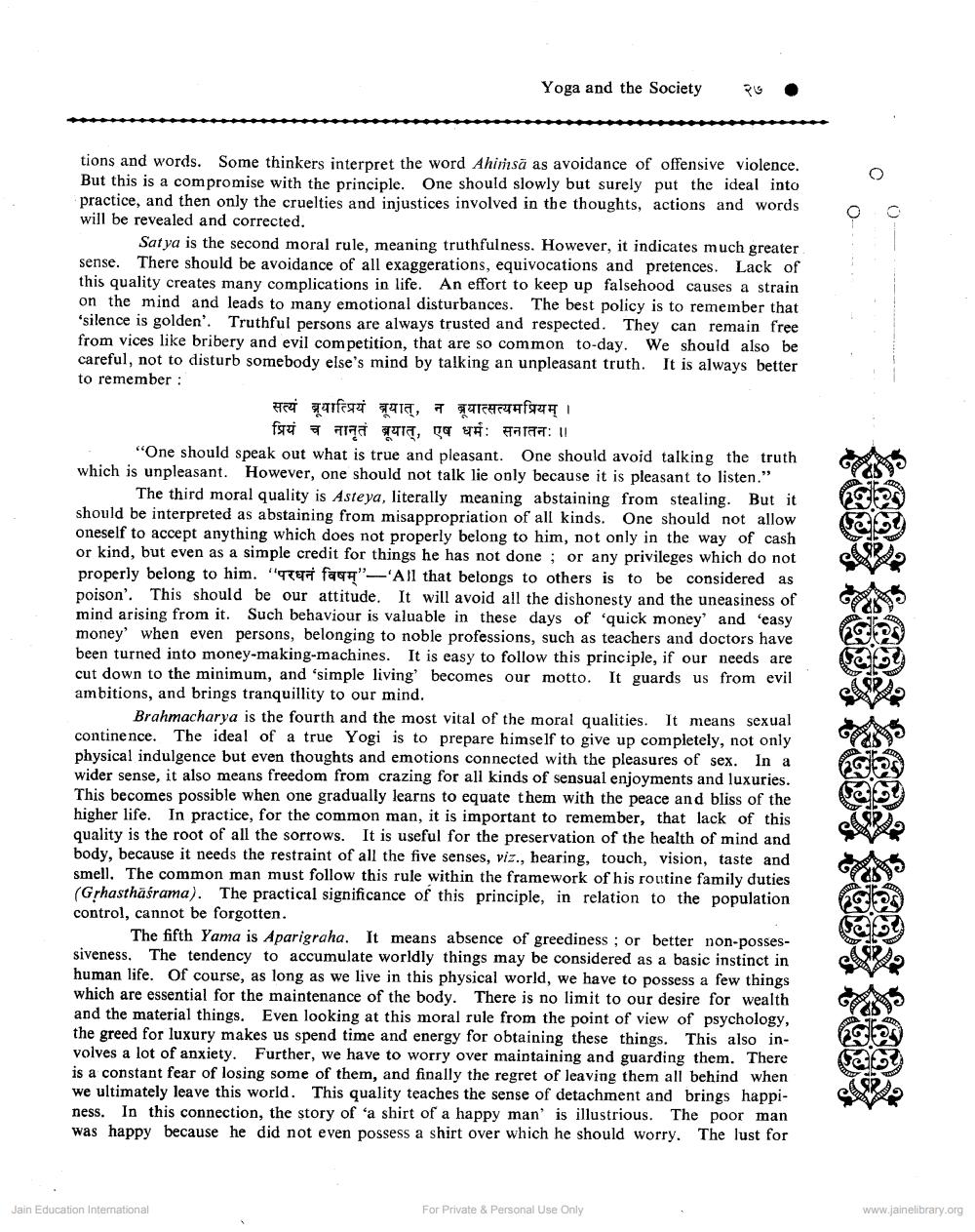Book Title: Yoga and the Society Author(s): R V Ranade Publisher: Z_Pushkarmuni_Abhinandan_Granth_012012.pdf View full book textPage 4
________________ Yoga and the Society PC tions and words. Some thinkers interpret the word Ahimsä as avoidance of offensive violence. But this is a compromise with the principle. One should slowly but surely put the ideal into practice, and then only the cruelties and injustices involved in the thoughts, actions and words will be revealed and corrected. Satya is the second moral rule, meaning truthfulness. However, it indicates much greater sense. There should be avoidance of all exaggerations, equivocations and pretences. Lack of this quality creates many complications in life. An effort to keep up falsehood causes a strain on the mind and leads to many emotional disturbances. The best policy is to remember that 'silence is golden'. Truthful persons are always trusted and respected. They can remain free from vices like bribery and evil competition, that are so common to-day. We should also be careful, not to disturb somebody else's mind by talking an unpleasant truth. It is always better to remember: सत्यं ब्रूयात्प्रियं ब्रूयात्, न ब्रूयात्सत्यमप्रियम् । प्रियं च नानृतं ब्रूयात्, एष धर्मः सनातनः ।। "One should speak out what is true and pleasant. One should avoid talking the truth which is unpleasant. However, one should not talk lie only because it is pleasant to listen." The third moral quality is Asteya, literally meaning abstaining from stealing. But it should be interpreted as abstaining from misappropriation of all kinds. One should not allow oneself to accept anything which does not properly belong to him, not only in the way of cash or kind, but even as a simple credit for things he has not done ; or any privileges which do not properly belong to him." face"-'All that belongs to others is to be considered as poison'. This should be our attitude. It will avoid all the dishonesty and the uneasiness of mind arising from it. Such behaviour is valuable in these days of 'quick money' and 'easy money' when even persons, belonging to noble professions, such as teachers and doctors have been turned into money-making-machines. It is easy to follow this principle, if our needs are cut down to the minimum, and 'simple living becomes our motto. It guards us from evil ambitions, and brings tranquillity to our mind. Brahmacharya is the fourth and the most vital of the moral qualities. It means sexual continence. The ideal of a true Yogi is to prepare himself to give up completely, not only physical indulgence but even thoughts and emotions connected with the pleasures of sex. In a wider sense, it also means freedom from crazing for all kinds of sensual enjoyments and luxuries. This becomes possible when one gradually learns to equate them with the peace and bliss of the higher life. In practice, for the common man, it is important to remember, that lack of this quality is the root of all the sorrows. It is useful for the preservation of the health of mind and body, because it needs the restraint of all the five senses, viz., hearing, touch, vision, taste and smell. The common man must follow this rule within the framework of his routine family duties (Grhasthaśrama). The practical significance of this principle, in relation to the population control, cannot be forgotten. The fifth Yama is Aparigraha. It means absence of greediness ; or better non-possessiveness. The tendency to accumulate worldly things may be considered as a basic instinct in human life. Of course, as long as we live in this physical world, we have to possess a few things which are essential for the maintenance of the body. There is no limit to our desire for wealth and the material things. Even looking at this moral rule from the point of view of psychology, the greed for luxury makes us spend time and energy for obtaining these things. This also involves a lot of anxiety. Further, we have to worry over maintaining and guarding them. There is a constant fear of losing some of them, and finally the regret of leaving them all behind when we ultimately leave this world. This quality teaches the sense of detachment and brings happiness. In this connection, the story of a shirt of a happy man is illustrious. The poor man was happy because he did not even possess a shirt over which he should worry. The lust for 352 Jain Education International For Private & Personal Use Only www.jainelibrary.orgPage Navigation
1 2 3 4 5 6
